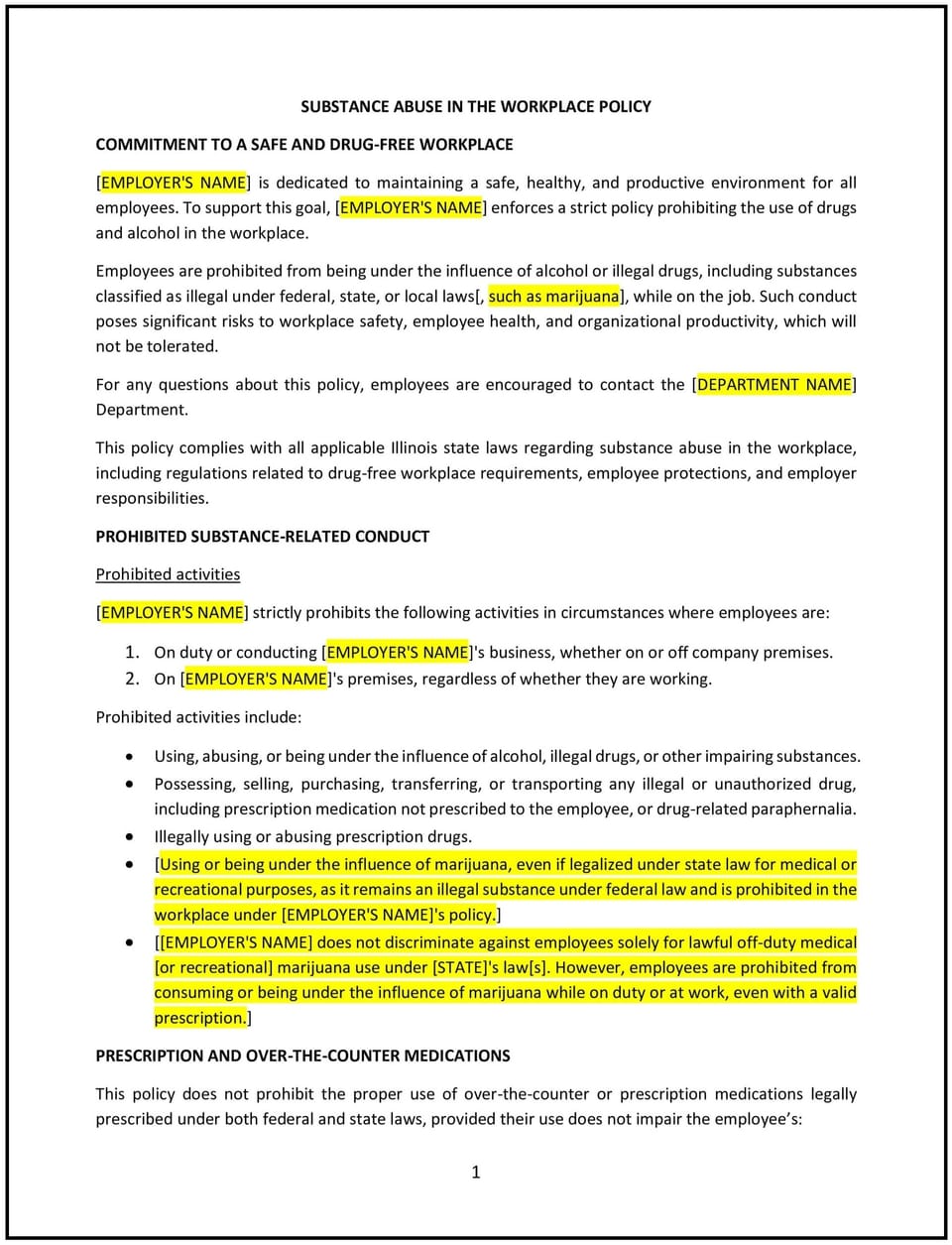Substance abuse in the workplace policy (Illinois): Free template

Substance abuse in the workplace policy (Illinois)
This substance abuse in the workplace policy is designed to help Illinois businesses address and prevent substance abuse issues among employees. It establishes guidelines for maintaining a safe and drug-free workplace while supporting employees through education and assistance programs. The policy aligns with Illinois laws, including the Illinois Drug-Free Workplace Act and regulations regarding the use of recreational cannabis.
By adopting this policy, businesses can promote safety, strengthen compliance, and foster a healthy work environment.
How to use this substance abuse in the workplace policy (Illinois)
- Define prohibited substances: Specify substances that are prohibited in the workplace, including illegal drugs, alcohol, and the misuse of prescription medications.
- Address cannabis use: Clarify how recreational and medical cannabis use is handled under Illinois law, including restrictions on impairment during work hours.
- Establish testing procedures: Outline when drug or alcohol testing may be conducted, such as pre-employment, post-incident, or reasonable suspicion testing, in compliance with Illinois laws.
- Promote education: Provide information about the risks of substance abuse and resources for seeking help, such as employee assistance programs (EAPs).
- Include disciplinary actions: Specify consequences for policy violations, such as warnings, mandatory rehabilitation programs, or termination, depending on the severity.
- Support rehabilitation: Offer options for employees seeking assistance, including access to counseling or substance abuse programs.
- Ensure confidentiality: Emphasize that all records related to substance abuse issues or testing will be handled discreetly and securely.
- Monitor compliance: Regularly review workplace practices to ensure adherence to this policy and Illinois legal requirements.
Benefits of using this substance abuse in the workplace policy (Illinois)
This policy provides several benefits for Illinois businesses:
- Promotes safety: Reduces the risk of accidents and injuries caused by substance impairment in the workplace.
- Enhances compliance: Aligns with Illinois laws regarding drug-free workplaces and cannabis regulations.
- Encourages employee well-being: Provides resources and support for employees dealing with substance abuse issues.
- Reduces liability: Minimizes legal risks associated with workplace substance abuse incidents.
- Maintains productivity: Addresses substance abuse issues promptly to reduce absenteeism and performance issues.
Tips for using this substance abuse in the workplace policy (Illinois)
- Communicate the policy: Share the policy with employees during onboarding and include it in the employee handbook.
- Train managers: Provide training on recognizing signs of substance abuse and handling policy violations appropriately.
- Promote resources: Encourage employees to seek help through available programs, such as EAPs or community support groups.
- Document incidents: Maintain detailed records of substance abuse incidents, testing, and disciplinary actions to ensure transparency.
- Update regularly: Revise the policy to reflect changes in Illinois laws, workplace practices, or emerging substance abuse trends.
Q: What substances are prohibited under this policy?
A: Prohibited substances include illegal drugs, alcohol, and the misuse of prescription medications. Restrictions also apply to cannabis impairment during work hours.
Q: How does the policy address recreational cannabis use?
A: Employees may use cannabis outside of work hours in compliance with Illinois law but are prohibited from being impaired or under the influence while on duty.
Q: When can drug or alcohol testing be conducted?
A: Testing may be conducted pre-employment, post-incident, based on reasonable suspicion, or as part of a rehabilitation program, in compliance with Illinois laws.
Q: What resources are available for employees dealing with substance abuse?
A: Employees can access resources such as employee assistance programs (EAPs), counseling, or referrals to substance abuse treatment programs.
Q: What happens if an employee violates this policy?
A: Consequences may include verbal or written warnings, suspension, mandatory rehabilitation, or termination, depending on the severity of the violation.
Q: How is confidentiality maintained?
A: All records related to substance abuse issues, testing, and treatment are handled confidentially and stored securely.
Q: Does this policy apply to contractors or visitors?
A: Yes, all individuals on company premises, including contractors and visitors, are expected to comply with this policy.
Q: How often is this policy reviewed?
A: This policy is reviewed annually or whenever significant changes occur in Illinois laws or workplace practices.
This article contains general legal information and does not contain legal advice. Cobrief is not a law firm or a substitute for an attorney or law firm. The law is complex and changes often. For legal advice, please ask a lawyer.


